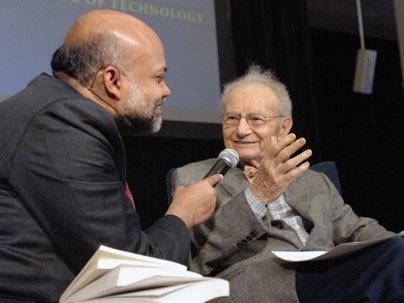Celebrating the inauguration of MIT's Legatum Center for Development & Entrepreneurship, a panel of five Nobel laureates in economics, including Institute Professor Paul A. Samuelson, spoke on "the role of entrepreneurship in development" as part of a daylong symposium on Oct. 7.
"Most development so far has targeted those in the middle class, and has hurt the poor and the ultra-poor," Samuelson said.
That's the kind of pattern that the Legatum Center hopes to change. By encouraging entrepreneurship in developing countries around the world, it aims to foster a self-sustaining pathway out of poverty for the regions that need it the most. "I commend your organization," Samuelson told center Director Iqbal Quadir and an audience that included the center's first group of a dozen Legatum fellows, "because you're giving some attention to something that had been neglected."
Eric Maskin of the Institute for Advanced Study in Princeton, a 2007 laureate, asked "why inequality has actually increased in so many poor countries, when the theory of competitive advantage predicted just the opposite -- that globalization should have led to a decline in inequality in poor countries."
The problem, he said, is that globalization has helped those with relatively high skill levels by opening them up to international markets, but those without the skills have been left behind. "The answer is not to stop globalization," he said, "but rather to bring the people at the bottom to a point where they too can participate in global markets." That's not easy, he said, but requires a bottom-up approach of focusing foreign aid on education and skills development.
The Legatum approach of fostering local entrepreneurship, he said, has many advantages. "Entrepreneurs do have an incentive to get it right, to help those at the bottom," because they need "a well-trained, well-educated labor force." As a result, "the investment spills over to benefit the society in general."
Edmund Phelps of Columbia University, the 2006 laureate, said "innovation is behind a thriving economy," so it's important to find ways to encourage the development within a given country of "new ideas for new kinds of commercial goods, or new ways to produce commercial goods." But it's not necessarily new technological products that bring benefits, because those can simply be copied by other countries.
But even in a very poor country, he said, "there can be changes made at the lowliest levels of production. There can be changes, improvements, and a deep satisfaction from discovering a new way to do something."
Robert Merton of Harvard University, a 1997 laureate, said that one thing that can foster such a culture of innovation is a wide-ranging education, providing a more flexible and adaptable workforce. Rather than focusing on specific job training and technical education, "maybe it's worth it to expend the resources to have a broader education," he said, because that leads to a population that's more able to adapt to a rapidly changing work environment.






